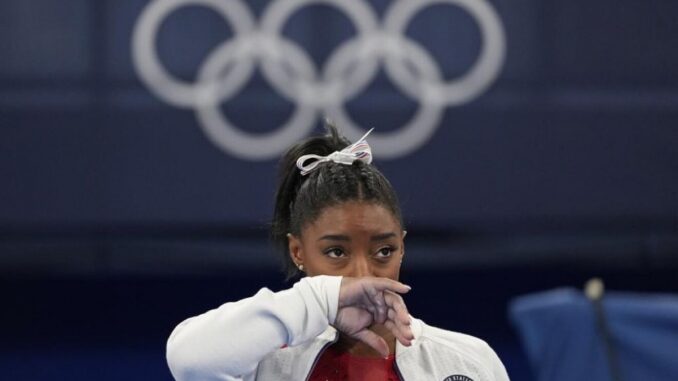
Speaking on why she felt compelled to talk to FOX News after Biles’ spat with Gaines, Skinner said to Will Cain: “Well, throughout my career, there’s been many times where I have been belittled and bullied by Simone and have wanted to keep quiet for the other athletes.
“And there has been just many times through my Olympic journey and through camps, training, everything that we have gone through have been multiple times where she has come and belittled all of us. “And I’ve wanted to stay silent through this because she has a huge platform to have people speak up and stand by her side. And I have kept quiet to not make any more disruptions through the athletes of college and through the Olympics.”
When most people think of Simone Biles, they see a world champion, an Olympic gold medalist, and one of the greatest gymnasts in history. But what happens behind the scenes? What about those who worked alongside Simone, sharing the same space, competing in the same events, but dealing with their own personal challenges?
This story isn’t about Simone’s triumphs. It’s about my experience as her teammate—my journey of being belittled, bullied, and pushed to the brink of despair in a world where physical and mental strength are paramount. In this article, I’ll take you through the raw truth of my time as part of the gymnastics elite, how I was treated, and how it impacted me on a personal and emotional level.
The Pressure of Being on a Winning Team: The Price of Perfection
Gymnastics is not just a sport; it’s a lifestyle. Being part of a high-performance team means hours of grueling training, constant scrutiny, and the pressure to be perfect. But what happens when the very people who are supposed to support you, your teammates, become your source of pain?
In the world of gymnastics, there’s an unspoken hierarchy. The top athletes, like Simone Biles, often receive the lion’s share of praise, accolades, and attention. Meanwhile, those of us on the sidelines—though still incredibly skilled—can sometimes feel overlooked, unimportant, or even inferior.
As a member of the team, I found myself constantly fighting for recognition. Every day, I worked just as hard, but it never felt enough. And when you’re overshadowed by someone as remarkable as Simone, it can create an environment where bullying and belittlement thrive.
Being Ignored While Sharing a Stage with a Superstar
When you’re on a team with someone like Simone Biles, it’s hard not to feel small. The media, the coaches, and the fans are all focused on one person—Simone. For her, it was easy to take the spotlight. She was a natural, a prodigy. But for the rest of us, it felt like we were invisible.
I remember the long hours spent training, perfecting routines, and pushing my body to its limits. Yet, no matter how hard I worked, it felt like I was always in the shadows. Simone’s incredible success only amplified my feelings of inadequacy. The other gymnasts, as well as the coaches, seemed to revolve around Simone’s brilliance, leaving little room for anyone else.
The Subtle Acts of Bullying: How It Begins
At first, the bullying was subtle. It wasn’t the overt taunts or insults you might expect. Instead, it was the quiet moments—the glances, the whispers, the exclusion.
It started with being left out of team conversations. The more I tried to participate, the more distant the others became. I remember trying to share a victory, however small, only to be met with a cold stare or a quick change of subject. I began to feel like I didn’t belong.
Simone, for all her fame, wasn’t directly involved in these actions, but her presence made it worse. She was always the “golden girl,” the standard we were all expected to live up to, even if we didn’t get the same resources or attention. The other gymnasts, many of whom were also incredibly talented, found it easier to tear me down than to lift me up.
Isolation in a Group: How Cliques Form in High-Performance Teams
Sports teams, especially those as competitive as a gymnastics squad, often develop cliques. Those at the top, the “stars,” naturally form bonds. They train together, travel together, and ultimately, they connect on a level that those outside the group can’t understand.
This wasn’t just an issue between me and Simone. It was a systemic problem within our team. The pressure to constantly be the best created division. Those who couldn’t keep up were pushed to the periphery, not just in training but also in the social aspect of team life. I was one of those who found myself on the outside looking in.
I felt completely isolated in a group that was supposed to be my support system.
The Mental and Emotional Toll of Constant Bullying
As the bullying progressed, I started to feel like I was losing myself. The constant feeling of being belittled, ignored, and excluded began to take a toll on my mental and emotional health. Gymnastics, which was once a passion, became a source of dread.
I would wake up every morning with a pit in my stomach, not because I didn’t want to train, but because I feared the judgment of my teammates. My self-esteem plummeted. I began to question my worth as an athlete and as a person.
Overcoming the Struggles: Finding Strength in Adversity
Despite the bullying and isolation, I refused to let it define me. In fact, I started to channel my frustration into my training. I worked harder, pushed through the physical pain, and focused on what I could control.
Through this process, I discovered my own inner strength. Instead of succumbing to the negative environment, I fought back in the only way I knew how: through perseverance. This mindset shift helped me regain my sense of purpose, even if the external environment remained toxic.

Speaking Up: Why It Took Me Years to Share My Story
One of the hardest parts about dealing with bullying in a high-performance team is the culture of silence. Everyone is expected to perform, to be perfect, and to put their personal feelings aside for the greater good of the team. But no one ever really talks about the emotional side of being an athlete, especially one who feels invisible or disrespected.
For years, I kept my story to myself. I was afraid that speaking out would make me seem weak or ungrateful. But over time, I realized that sharing my experience was important—not just for my own healing, but also for others who may be going through similar struggles.
The Realities of Being in Simone Biles’ Shadow
While Simone was a trailblazer, the pressure to match her success was immense. We were all expected to live up to her standard, but not everyone was built the same way. For some, like myself, being constantly compared to Simone Biles was more of a burden than an honor.
The problem wasn’t Simone herself; it was the external expectations. Being on the same team as the greatest gymnast of all time often felt less like an opportunity and more like a constant reminder of my own perceived inadequacies.
Healing and Moving Forward: What I Learned From My Experience
Looking back, I’ve learned some invaluable lessons from my time as Simone Biles’ teammate. The bullying and belittlement that I endured were painful, but they shaped me into the person I am today.
First, I learned that true strength comes not from physical ability alone but from emotional resilience. Second, I learned that it’s okay to speak up and advocate for yourself. The culture of silence in competitive sports needs to be shattered, and only by doing so can we hope to change the toxic dynamics that sometimes exist within these elite environments.
Conclusion: A Journey of Resilience and Reflection
My time as Simone Biles’ teammate wasn’t what I expected. It was filled with both incredible moments and heartbreaking ones. The bullying I endured shaped my career, my character, and my future. But through it all, I’ve emerged stronger, wiser, and more aware of the importance of mental health and emotional well-being in sports.
I hope that by sharing my story, I can shed light on the hidden struggles that athletes often face, no matter how successful or talented they are.